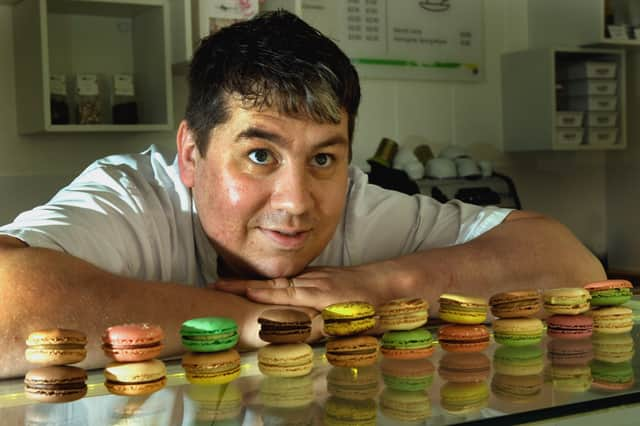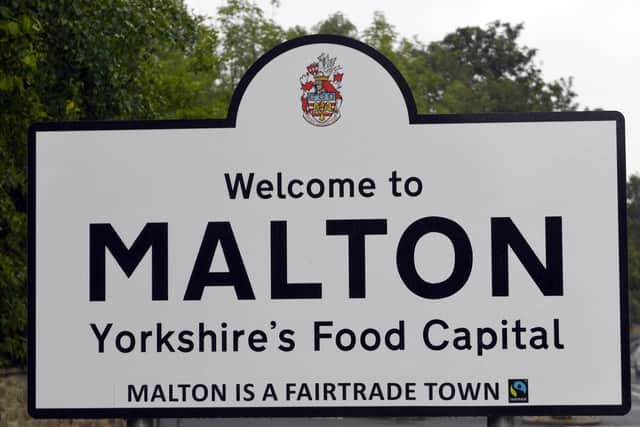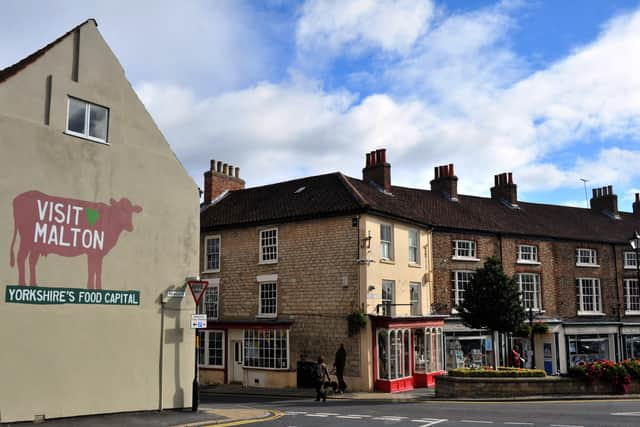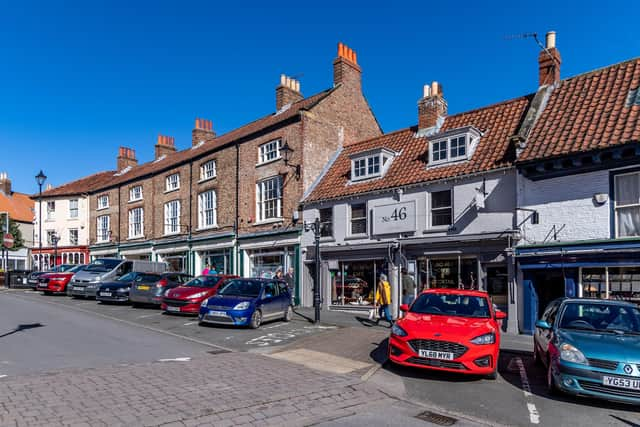Yorkshire’s market town gems – Why food is Malton’s bread and butter


Its repurposing is typical of a town for which food is not only a way of life, but life itself.
The Hans Christian Andersen architecture of the former civic headquarters, and the butter market which abuts it, dominates the market place. In the 18th century, this was the bread basket of Yorkshire, and it grew fat on the proceeds of the dairy produce that passed through it.
Advertisement
Hide AdAdvertisement
Hide AdFast forward 300 years and Malton is once again the Food Capital of Yorkshire, a title invented by its own marketing people. It has been, like the rest of the country, on a bread and water diet these last few months. But with the summer has come a new appetite and something of a reawakening.


There is no point denying that life has been tough for the town’s vast community of butchers, bakers, caterers and assorted other traders. Yet paradoxically, a few of them report having never been busier.
“The thing is, people had always wanted to shop locally but for various reasons they ended up going to Morrisons,” says Tom Naylor-Leyland, of the Visit Malton community interest company. “Now they are having to reconsider. No-one wants to queue with hundreds of people in a supermarket if they don’t have to.”
Mr Naylor-Leyland, heir to the Fitzwilliam Estate, which commissioned the old Town Hall in 1749 and now runs shops, pubs, hotels and farms in the area, believes that market towns such as this will become social and business hubs for the post-pandemic population.
Advertisement
Hide AdAdvertisement
Hide Ad“I hope and I predict that market towns, rather than big cities, will be more relevant than ever after Corona because people have realised that you can work remotely. So why wouldn’t you enjoy the quality of life that places like this bring – with wonderful shops and services, fast broadband and yet only five minutes away from beautiful countryside. I hope it will be a lasting phenomenon.”


He was taken aback, he says, at how quickly Malton’s traders changed their bricks-and-mortar business models into online operations at the start of the quarantine.
Florian Poirot, a pastry chef who runs a patisserie in the Talbot Yard food court, has managed even to arrange the export of macarons to his native France.
“I was very worried about businesses, and I’m not saying things haven’t been challenging. Yet greengrocers and butchers have said they are busier than they’ve ever been,” says Mr Naylor-Leyland.
Advertisement
Hide AdAdvertisement
Hide Ad“Clearly for restaurants it has not been so easy. But what I could not have predicted is that online businesses are also now looking for bigger premises here, even though their sales are mostly on the internet, because they want a nice showroom for their products. And an attractive market town with rents that are much cheaper than the centre of York for instance, seems to be a good fit.”


It was the popularity of Malton amongst food and drink producers and retailers that inspired its marketing as Yorkshire’s Food Capital, and its offer extends now to specialist stalls, festivals and even a French-style marathon, in which the runners pause for food and drink at designated refreshment stops on the route.
Most of those have been cancelled this year, although the Christmas markets, which attracted 20,000 visitors last year, may still go ahead in some form.
However, the open air food market, which takes place on the second Saturday of each month, has returned, with a one-way system to guide visitors through the three dozen vendors.
Advertisement
Hide AdAdvertisement
Hide AdMr Naylor-Leyland characterises today’s Malton as “a town of makers”, but while its reputation has grown over the last few years, helped by ambitious initiatives like the collaboration between local food producers and Claridge’s for a “Malton in Mayfair” event two years ago, the town remains a political backwater. The former occupants of the Town Hall have moved half a mile up the road, and while this remains the principal settlement within the Ryedale district it wields less clout as a tourism destination than the neighbouring administrations of York and Scarborough.
That, however, is a power balance ripe for renegotiation.
Last month, North Yorkshire’s seven district councils, Scarborough and Ryedale among them, were told by the Government that they may have to be sacrificed if the county is to benefit from the greater powers and control over spending that devolution would bring.
The councils have until next month to propose alternative arrangements for perhaps the biggest administrative reshuffle since the 1970s, with the creation of one or two combined authorities under an elected Mayor a likely outcome.
It is an exercise that calls for “creative thinking”, says Keane Duncan, a native of Malton who leads Ryedale Council and sits on the county authority.
“Change is coming, there’s no doubt about that,” he says.
Advertisement
Hide AdAdvertisement
Hide AdIdeally placed in the Vale of Pickering, between the coast, the North York Moors and York itself, Malton looks towards York and Scarborough in its marketing, says Mr Duncan. “The three authorities have a close affinity with each other and if they were to be combined in a single body, you’d have a tourism powerhouse that nobody could compete with anywhere else in the country,” he argues.
“I’m not opposed to change – I just want to make sure that all the links we have with local people and local businesses are maintained,” adds Mr Duncan, a journalist by trade who at 25 is one of the youngest council leaders in the country.
Although his position might be disappearing, he will stay put, he insists. “It’s always difficult in rural areas to attract and retain younger people – they tend to go away and study and they end up in cities. But I love it here – it’s my town. It’s the sort of place where everybody knows everyone and you know who’s going to be serving you when you go shopping.
“I want to make sure it’s protected for others as well.”
• There is not a town in France without a patisserie selling its own variety of meringue macarons, but in some parts of the country they would rather have them shipped in from Yorkshire.
Advertisement
Hide AdAdvertisement
Hide AdFlorian Poirot has been baking them at his shop behind the Talbot Hotel on Yorkersgate in Malton since he opened it three years ago. They now account for half his business, and in order to fulfil orders from his website he is in the process of arranging deliveries overseas.
“I will be shipping to France very soon and Switzerland and other parts of Europe by the end of the year,” he says.
A native of Nancy in eastern France, Monsieur Poirot had been living in Paris until 10 years ago, when he upped sticks to Britain with his wife, Celine, to take a research job at Nestlé in York.
Neither of them spoke English when they arrived and Florian retains a heavy French accent. People tell him it’s a good marketing tool.
Advertisement
Hide AdAdvertisement
Hide AdThe location of his shop, alongside five other artisan food and drink producers in a corner of Malton’s town centre, is an ideal base, he says.
“If I had a shop in London it would be no different to this.”
Editor’s note: first and foremost - and rarely have I written down these words with more sincerity - I hope this finds you well.
Almost certainly you are here because you value the quality and the integrity of the journalism produced by The Yorkshire Post’s journalists - almost all of which live alongside you in Yorkshire, spending the wages they earn with Yorkshire businesses - who last year took this title to the industry watchdog’s Most Trusted Newspaper in Britain accolade.
Advertisement
Hide AdAdvertisement
Hide AdAnd that is why I must make an urgent request of you: as advertising revenue declines, your support becomes evermore crucial to the maintenance of the journalistic standards expected of The Yorkshire Post. If you can, safely, please buy a paper or take up a subscription. We want to continue to make you proud of Yorkshire’s National Newspaper but we are going to need your help.
Postal subscription copies can be ordered by calling 0330 4030066 or by emailing [email protected]. Vouchers, to be exchanged at retail sales outlets - our newsagents need you, too - can be subscribed to by contacting subscriptions on 0330 1235950 or by visiting www.localsubsplus.co.uk where you should select The Yorkshire Post from the list of titles available.
If you want to help right now, download our tablet app from the App / Play Stores. Every contribution you make helps to provide this county with the best regional journalism in the country.
Sincerely. Thank you.
James Mitchinson, Editor
Comment Guidelines
National World encourages reader discussion on our stories. User feedback, insights and back-and-forth exchanges add a rich layer of context to reporting. Please review our Community Guidelines before commenting.